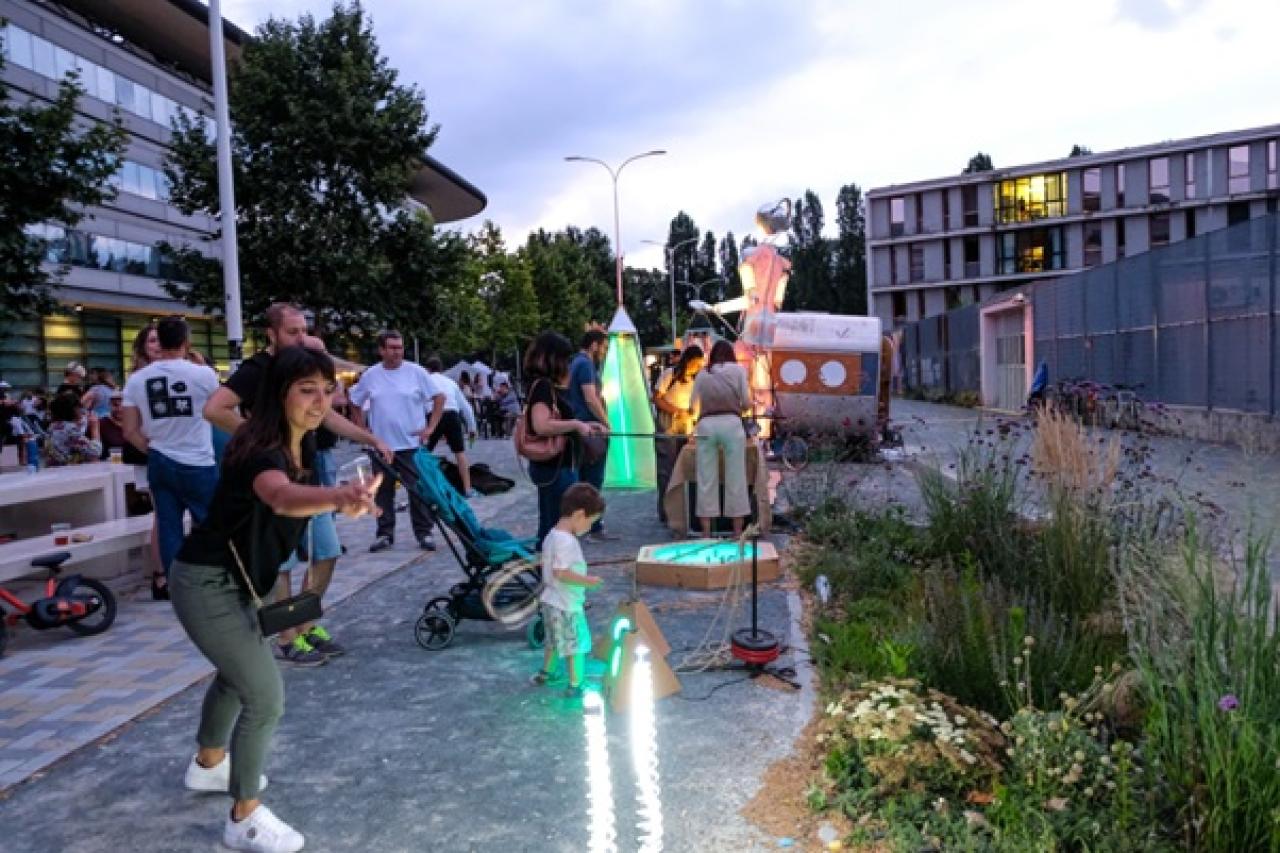The experience of the 2Nite Urbact network shows us how urban security is a complex and multifaceted concept, extending far beyond the simple notion of crime prevention. Urban security encompasses the comprehensive safety and well-being of individuals within urban environments, acknowledging the intricate interplay between tangible threats and the perception of security. The goal of the project is to overcome the securitarian approach, which focuses primarily on law enforcement and punitive measures, fostering instead the underlying causes of insecurity. While crime must be prosecuted, a more comprehensive strategy is needed to foster a sense of safety and well-being. Cities and municipalities face numerous challenges that threaten social cohesion, including crime and polarization. These issues are distinct but interconnected. Social and political polarization can contribute to violent radicalization and extremism, while crime can fuel feelings of insecurity and exacerbate polarization.
Urban security transcends simple crime prevention, delving into the nuanced realm of perceived safety. Citizens' anxieties, often rooted in fear rather than concrete threats, are as critical to address as actual crime statistics. Cultivating robust social cohesion is paramount; it's the bedrock of inclusive, safe cities, fostering trust and mutual support. Effective strategies demand a holistic lens, tackling the deep-seated origins of insecurity—poverty, inequality, and lack of opportunity. This necessitates active community engagement, where residents become partners in shaping their safety, alongside seamless collaboration between diverse agencies, from law enforcement to social services. Data-driven decision-making, utilizing analytics to understand trends and evaluate interventions, is indispensable. While polarization poses a significant challenge, eroding trust and fragmenting communities, its impact can be mitigated by intentionally strengthening social cohesion, bridging divides, and promoting understanding.
For this reason, the 2Nite network aims to transfer the multidisciplinary and inclusive approach of the Urban Innovative Actions project ToNite to the topic of urban security during evening and night. It will focus on how the collaboration with local stakeholders and communities and the provision of new services at night-time for reviving public spaces may be crucial for improving residents’ perception of safety at night.
The Turin innovative practice
2Nite aims at transferring the multidisciplinary and inclusive approach of UIA ToNite to the topic of urban security during evening and night: how the collaboration with local stakeholders and communities and the provision of new services at night-time for reviving public spaces may be crucial for improving residents’ perception of safety at night.

Map of projects in the Lungo Dora area. Souce: ToNite project
Empowerment and community engagement activities
A central action within the project is the activation and empowerment of the local stakeholders and communities. In pursuit of this goal, the project partner, SocialFare, implemented two key participatory initiatives in recent months. The first of these initiatives was the launch of a comprehensive questionnaire. This questionnaire was designed to reveal the hidden qualities of the areas situated along the Dora River, specifically targeting individuals who live, work, study, or frequently visit the Aurora district in Turin. The questionnaire included a series of questions intended to elicit detailed insights into the experiences and perceptions of these individuals. The findings from this questionnaire have been compiled into a detailed report.
The second key participatory initiative was a structured participatory process, consisting of four meetings. These meetings were organized to collaboratively envision and develop future scenarios for the areas along the Dora, focusing particularly on the Aurora neighborhood, as well as the area surrounding Campus Einaudi. This process was intentionally inclusive, welcoming participation from the entire community, including citizens of all ages, residents, workers, students, and anyone with a general interest in the project. Furthermore, institutions, businesses, and associations were also encouraged to participate. The core principle of these meetings was collaborative work, emphasizing the importance of gathering diverse perspectives from groups of individuals with varying ages, backgrounds, and life experiences. Guided by experts from SocialFare | Centre for Social Innovation, participants were provided with opportunities to express themselves and actively contribute to the creation of new scenarios and insights. To further explore the potential opportunities within these areas, three events were held at the Cecchi Point Neighbourhood House and Off Topic. These events served to present the findings of ethnographic research and to facilitate discussions with citizens regarding the area's strengths, opportunities, and unexpressed potential."
A new storytelling for communication with and about the territory
The ToNite project has adopted a narrative-driven strategy to address concerns regarding safety, social cohesion, and community belonging within the targeted area. A cornerstone of this strategy is "The River of Biographies," a storytelling initiative that culminated in the production of ten short films. These films showcase the personal stories of ten residents with migrant backgrounds, aiming to foster understanding and empathy.
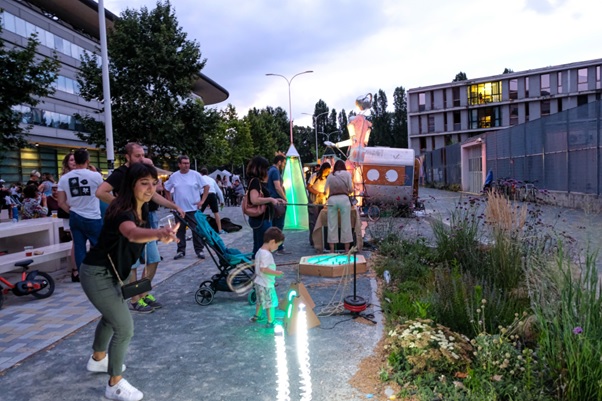
Image: public space activation in the ToNite project in Turin. Souce: ToNite
The project's thematic framework centers on several key areas, beginning with the exploration of resources and uniqueness. Residents have identified distinct resources and unique elements that characterize the two areas under investigation. The project also examined work, recognizing that the two areas possess contrasting economic and work ecosystems that have undergone significant transformations in recent years.
Contextual characteristics were considered to provide background for the critical issues identified, though these factors were not deemed to directly influence perceptions of insecurity and livability. Education and cultural capital emerged as crucial elements for the successful integration of individuals into the urban and social fabric.
Urban regeneration interventions
The ToNite project prioritized creating safer urban spaces through co-designed interventions with residents and end-users. This led to the completion of three significant urban regeneration projects in previously neglected areas. Firstly, an abandoned space near the University was transformed into an accessible pedestrian and cycling avenue. Secondly, a long-closed garden was revitalized with new street furniture and children's play equipment. Lastly, the riverbanks, perceived as unsafe at night, received multifunctional street furniture combining seating, lighting, and signage for local landmarks. In total, over 7,000 square meters of public space were regenerated.
Activation of new proximity services
The ToNite project aimed to enhance livability and perceived safety during evening and nighttime hours by activating new proximity services. This was achieved through a call for proposals that successfully engaged 59 local organizations, forming 19 distinct projects. These projects, supported by technical and financial resources, focused on social innovation and local service delivery, targeting strategic actors such as universities, schools, migrant communities, community hubs, and grassroots associations.
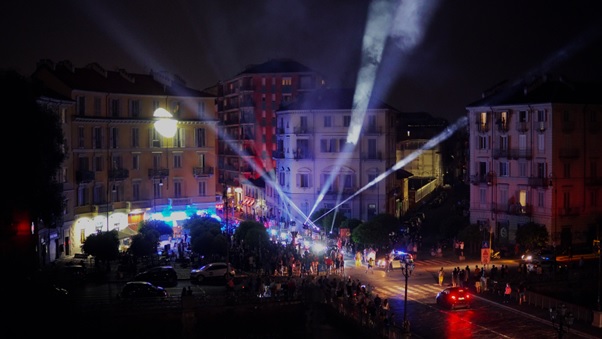
Image: public space activation in the ToNite project in Turin. Souce: ToNite
The call for proposals, which allocated €1 million in non-repayable contributions, sought to improve public spaces along the Dora River, particularly during evening hours. Fourteen projects were selected for the Aurora district stretch of Lungo Dora, while five were chosen for the Campus Einaudi area. These projects employed diverse strategies, including socialization and inclusion activities (tactical urbanism, video projections, sports), area care initiatives, and the activation of cultural, socio-educational, and socio-healthcare centers. A unifying element was the active involvement of local residents and frequent visitors in these spaces.
The 2Nite partnership
The 2Nite project partnership is led by the City of Turin, who is sharing the experience done within the ToNite project funded by the Urban Innovative Action program, together with the cities of Riga in Latvia, Cluj Napoca in Romania, Sant Boi de Llobregat in Spain and Quadilatero Urbano, composed by the Municipalities of Barcelos, Braga, Guimarães and Vila Nova de Famalicão, in Portugal.
Sant Boi de Llobregat aims at developing a project focused on the youth population, seeking to generate a nighttime environment of safety and entertainment that covers their needs on 3 levels: avoiding conflicts; providing help and support if disputes do occur, and repairing damage and restoring relationships when controversies have already occurred. It would focus on 3 poles of territorial and material attraction in a population with village demographics where it is relatively easy to achieve a significant population impact: sports fields, cinema halls and municipal swimming pool.
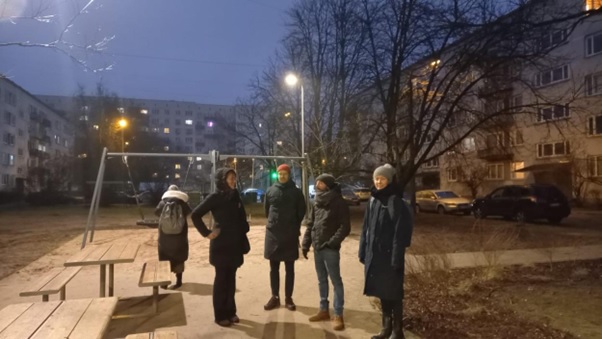
Image: Site visit to the Purvciems neihbourhood during the bilateral visit in Riga.
In Riga an opportunity is identified in working with the Riga Neighbourhood Residents’ Centre, which was established in 2021, where 7 neighbourhood coordinators are currently working. Neighbourhood coordinators are the first people in the municipality to whom residents can turn with their questions and initiatives regarding neighbourhood development, as well as receive feedback. Neighbourhood coordinators work closely with neighbourhood associations and other local communities, participate in activities organized by them, and organize various meetings for them with representatives of the municipality, so they know their neighbourhoods quite well. The neighbourhood coordinators inform the political and administrative leadership of the municipality about the most pressing neighbourhood problem issues, which, if necessary, gets involved in solving these issues.
The city of Braga has expertise in community-driven projects that engage residents in decision-making, particularly around public space improvements and sustainability initiatives. Additionally, Braga can share insights into its success with digital transformation in municipal services, including the early adoption of digital tools for urban planning and citizen engagement.
In respects to the City of Vila Nova de Famalicão, the city has a strong experience in terms of social inclusion projects in public housing estates, co-created with local inhabitants, therefore being able to share and deepen this know-how.
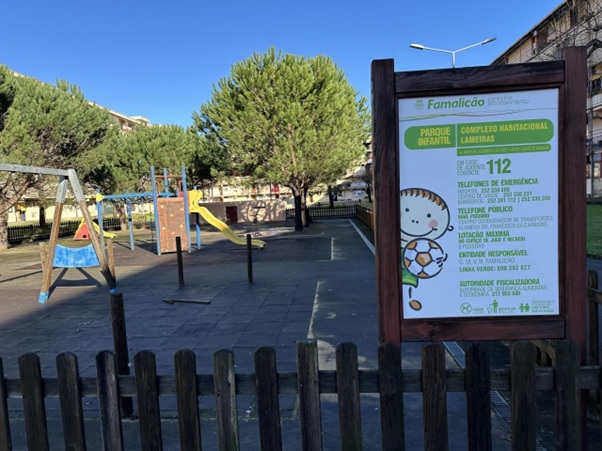
Image: playground in Lameiras social housing estate in Vila Nova de Famalicão
The City of Cluj can share our previous URBACT experiences, Innovato-R and Co4Cities that helped us have a better understanding on the possibilities to collaborate with the local community and also the experience of working with universities for research and evaluation of the activities. To develop our local project, Cluj aims at focusing on a pilot area that encompasses both urban regeneration and community engagement, particularly in areas currently underused. The objective of the project would be to activate these spaces in ways that promote social inclusion, safety, and active participation from the local community. The city aims to create an environment that encourages cultural activities, social interaction, youth participation and innovation. In this sense, Cluj is considering finding extra utility to the seven neighborhood city halls after working hours and try to open it to the community in the area as libraries, exhibition spots or meeting points, but still have to explore and find the most suitable ways to transform and use these public offices.
Conclusions
The 2Nite project offers the opportunity to explore the meaning of urban security and social inclusion in in public space by developing a non securitarian approach but instead a way to emancipate and include communities to make spaces livelier and safer. 2Nite aims to create cities where people feel safe, secure, and able to live their lives without fear. This requires a commitment to addressing both the tangible and intangible aspects of safety, fostering social cohesion, and building resilient communities. For these reasons it is essential to focus on security perception in public space.
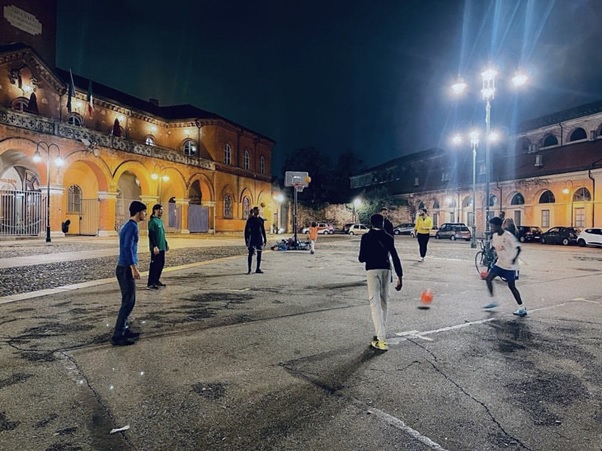
Image: public space activation in the ToNite project in Turin. Souce: ToNite
The perception of security in public spaces is not a trivial matter, it's a fundamental element that shapes the very fabric of urban life. When individuals feel safe, they are empowered to fully engage with their surroundings, fostering a sense of community and contributing to the overall well-being of the city. Conversely, a pervasive sense of insecurity can lead to social isolation, economic stagnation, and a diminished quality of life. Addressing security perception is therefore not merely a matter of crime statistics, but a crucial undertaking that involves creating inclusive and welcoming environments. This requires a multi-faceted approach, encompassing urban design, community engagement, and effective communication strategies. By prioritizing the perception of safety, we can cultivate vibrant public spaces that are accessible and enjoyable for everyone, fostering a stronger, more resilient urban community.

